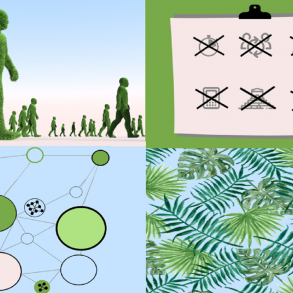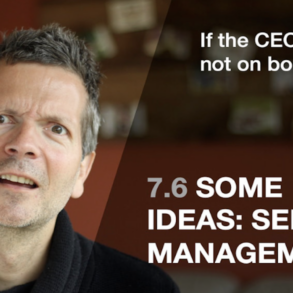
As we promised a couple weeks back in a post called “We Eliminated Management! See What Happens”, the Fitzii team has committed to writing about our experiences since we rid ourselves of traditional management roles in February of this year.
This move was inspired by the work of Frederic Laloux, and his book Reinventing Organizations, where he introduced the concept of a Teal organization to describe those companies that have eschewed traditional management structure in favor of self-management, have an evolutionary purpose (not a top-down direction), and an environment where employees truly bring their whole selves to work each day.
Since self-management is about the collective voice, in this first post we’ve chosen to ask members of the Fitzii team to present what they felt was good, bad, and amazing about our first six months as a Teal, self-managed organization.
So… Fitzii eliminated management, and this is what happened:
The Good
Greg (Product Development)
There have been so many good things to come out of our teal transition. We’ve all been pitching in to develop new processes for things like 360 feedback, compensation, hiring and termination, team goal-setting & targets, offsite planning, and more. It’s a learning process where one person volunteers to take responsibility for an area and they seek the advice of the others. The idea is to get something workable with the knowledge that if we try it out and see ways to improve it, we can do that iteratively.
These are decisions that would traditionally have been made by management, but now we all contribute.
It’s been engaging and energizing for the team, with the excitement of charting new waters, and with everyone playing a part in it.
Jonna (Business Development)
Moving to a teal org structure was shocking to my system when we got started. I’ve reported to a manager for 25 years, who am I to make decisions? Once we made the plunge I started to see the good in Teal. Being able to make decisions for my department (which happens to be sales) was liberating.
I was able to take my 15 years of sales knowledge and start acting like a manager would but without the driving need for a title promotion.
Owning my own engagement and being able to change what I didn’t like and keep what I did like, and mentally having to really show up and pay attention to all aspects of our business and how sales impacted other departments are a few of my highlights.
Edwin (Marketing)
I have found that moving decisions from top-down management to the people who know and care the most about the decision, has created three big benefits at Fitzii:
- We’ve made better decisions – More informed, more thought-through, and with more buy-in.
- We’ve seen even higher employee engagement – As you’d expect, empowerment unleashes passion (as evidenced by the # of people waking up in the middle of the night with big ideas for the business).
- We’ve had more leaders step up – There’s been more opportunities for more people to lead more, and that has been great for everyone.
Luz (Hiring Success)
Creating essential processes – the type of processes created in a traditional organization by HR, finance or senior management – means that every team member has a say in how these essential things happen. Because s/he has a say, s/he also has a stake in making those processes work. For example, when you have participated in hiring someone, you are more likely to understand and support that person; to ensure s/he succeeds. That is true in hiring and it is turning out to be true in all areas of running our company.
Ian (Product Development)
From my perspective some of the good things to come out of our self-management journey so far are some of the Teal practices we’ve introduced and how effective they’ve been. The 360 review process and invitation to real-time feedback are great examples of processes that have helped us come together as a team.
The other great thing has been the support and engagement of our parent company and senior leadership. They’re interested and engaged, but give us enough space to make mistakes and learn from them.
Carla (Hiring Success)
When moving towards Teal and looking at various artifacts that needed addressing, regular one on one meetings were on the chopping block. Luz (my ex manager) and I thought it was a shame to get rid of our one on ones entirely because we really enjoyed them and found them helpful.
Trying to be more Teal with these interactions, I urged her to take a more active part in sharing during these meetings. Up until this point it had mostly been me sharing and her providing me with performance feedback. I wanted to know more about her experiences and what was vexing in her day to day duties.
We decided to try our own version of a format I’d used at a previous job. This format was Job, Development, Self (or JDS). We discussed how were doing with our job and tasks as currently described by our roles, how we were doing with any learning or development goals and how we were doing in our personal lives.
Between Luz’s willingness to participate in those meetings as a peer, and the JDS format providing some guidance on what to bring to those engagements, we were able to significantly change the dialogue and improve our working relationship. Our improved one on ones also gave us a platform for implementing the advice process.
The Bad
Luz (Hiring Success)
Since going Teal, we give and aspire to give more peer feedback than would be typical in a traditional organization. We realized in the giving and receiving of feedback that it was essential for us to spell out our strategy, plans, and roles – otherwise, we were holding each other to arbitrary or unspoken standards. I’m not sure I attribute our lack of clearly articulated strategy, plans, roles to our Teal organization; rather, we’re a start-up and creating these came at a natural point in our evolution.
Regardless, I’d recommend that other Teal teams have clearly articulated strategies, plans, and roles that engender clarity, purposeful work and decision-making, and a framework for feedback.
Greg (Product Development)
I wouldn’t say that there’s been anything truly bad, but there have been some rough patches. For example, when we started the advice process on how we would conduct our 360 feedback, we had several people wanting to be involved but we didn’t appoint a single person to be the decision-maker. Consequently, nothing got done until we realized and corrected it. The advice process on compensation also might have worked more effectively if we had involved our parent company’s senior management at an earlier stage. This is true because (i) they would have had useful stuff to contribute early on, and (ii) they would have felt better about our undertaking this process if they’d had input from the beginning.
These are things that we’re still developing a sense for and, considering that there’s no “established” way of carrying out a lot of these teal practices, it’s not surprising that there will be some rocky moments.
It’s also a balancing act allocating time to work on our teal processes. It takes significant time to figure these things out and we’ve found that having different people tackle different aspects helps divide up the work, but it can take time away from doing the core work of the business. Hopefully as we get these processes in place, we’ll be able to devote less time and energy to planning out how we work.
Carla (Hiring Success Team)
Going Teal in the first year of your career can be daunting, and junior employees may have different needs than seasoned employees.
The world of academia preps you for a traditional business environment with significant focus on your place in the hierarchy. The classroom is polarized, with the institution holding the power and the students conforming to expectations.
Walking into a self-managing structure can be jarring and requires deliberate habit breaking. I sometimes found myself craving more direction and looking for procedures to follow. It took a concerted effort to direct and manage myself and stop looking for a rule book.
Teal can feel like a world of open doors with many projects and opportunities to get involved in. I felt an expectation to take on more and that I had something to prove. This can be dangerous as there’s the potential to take on too much. It’s helpful to have a mentor or a buddy in the workplace who can help you set boundaries and be a voice of reason.
Working at another organization, my focus would have been limited to learning my role. Learning how to be on a Teal team was an added complexity. This felt overwhelming, I questioned if I could handle it and I wondered if I’d be better off at a traditional organization for the first year of my career. Sometimes it seemed like I was taking two steps forward and one step back, or that my learning was taking longer than expected.
Recently I’ve experienced some exponential growth, highlighting the importance of patience with junior team members. Now I can say I’ve learned and achieved more in 9 months here than I could have working under another structure.
Edwin (Marketing)
When we first eliminated managers we swung the pendulum too far and immediately stopped doing all things that we thought were “management” activities. As it turns out some of these things were necessary and valuable, and should just be done a little differently.
One example of this was how we shifted to making many important things group actions and decisions, instead of having a single leader/decision maker. Predictably, we saw that a committee approach creates less engagement and accountability. Eventually we realized it’s usually better to have the most passionate or knowledgeable person take the lead as the “Decision Maker”, and involve all those affected or interested in the advice process.
Another related example was in my own area of work. Almost exactly as the social media startup Buffer found when they discussed “What We Got Wrong About Self-Management“, we initially thought that Teal meant that everyone was the same, and therefore strategic work with wide scope affecting everyone was no longer “the boss’s job”.
But if driving strategic change is not part of people’s roles then it’s not getting the right attention. We didn’t create and align the strategies and goals of the different departments at Fitzii, and because of this experienced some misalignment of initiatives and expectations.
Self-management doesn’t mean that there aren’t people working on the higher level activities that affect everyone. It just means that people do that work without the additional responsibility (which we formerly had) of also governing the activities of others.
Ian (Product Development)
There are two challenges that spring to mind when I think about the past six months. The first is the time and effort it takes to become teal. Self-management is not, as some people think, a free-for-all with no structure. In fact, to function well as a teal organization, more structure is needed. We’ve spent time discussing, creating and tweaking processes to define how we hire, give feedback, set salaries, communicate, manage conflict, etc.
All super valuable and necessary, but definitely time consuming for an already lean team with big goals. This can lead to conflict between our short term results targets and our long term teal evolution and goals. This is a polarity we’ll need to continue to manage.
The second challenge has been more of a personal one. After being a manager for around 20 years, I was very comfortable in that role. I have received praise and recognition for being a good manager from team members and my managers alike and have had been lucky enough to lead some teams that delivered great results. Moving away from a structure that has worked for me well in the past has definitely been a source of anxiety and self-doubt.
Jonna (Business Development)
With all good things, came a few not so good things. I realized that I depended on someone else to tell me what to do from time to time! I had to do a reality check about my productivity and felt a little alone for a while as we were finding what worked for our team. I found that without someone to report to, I didn’t communicate enough about what I was doing or how the sales business was going. This wasn’t only bad for me, but it was bad for the team.
The Amazing
Greg (Product Development)
The most amazing thing about going teal has been all the positive qualities it’s brought out in the team: unity, trust, openness, to name a few. It’s democratic to be involving all members of the team in decision-making, and reassures everyone that we all have an equal voice.
The sense of trust comes from our full transparency on things like salaries, company financials, and company direction and strategy. For example, although it definitely felt strange when we went around the table telling the team about our personal compensation packages, it did a great job of clearing the air and building trust. There were some surprises, perhaps the biggest one being the wide range of complicated pay & bonus structures that we all have. Once it was all out in the open, we could then look at where the discrepancies were and what could be done to correct them.
So, although I wouldn’t name salary transparency itself as an amazing aspect of our teal transition, the effect of doing it, and the vulnerability and trust that it engendered, have gone a long way toward bringing the team together.
At our two-day team offsite, I really had the sense that our work as a team on transparency, trust and openness was paying off in a level of camaraderie and optimism that I don’t think would have been possible without all the work we’ve done going teal over the past 7 months.
Ian (Product Development)
What’s amazing about our transition is how far we’ve come in six short months. This exercise of thinking back over the journey so far really makes that apparent. Despite the challenges faced, we’ve built an incredible trust between the individual team members and can feel confident that we’re all pulling in the same direction towards the same goals. We’re not there yet, but the promise of what lies ahead as we continue to grow and mature is incredible.
Edwin (Marketing)
It has been amazing to see how self-management has created a richer environment for personal and leadership development. The two biggest drivers of this are increased feedback, and more leadership opportunities.
People have taken to heart that going Teal means we all own our engagement and results, and each person has the responsibility to provide direct feedback to others when they’re feeling let down or uncomfortable by a situation. This drives growth both for the person who has to respectfully deliver the feedback, as well as those receiving it.
I have received gifts of direct feedback I never would have heard when I was a manager. And there’s also the indirect feedback I’ve received simply by seeing which of my ideas and initiatives are supported, and which are not. Leadership at Fitzii is about people following along because they believe in you and your ideas, not your title. It’s amazing to see this Darwinian approach to ideas in action – the good ones thrive, and the bad ones die.
Similarly, because anyone can make any decision, and we all share the responsibility to fix problems and capitalize on opportunities, there has been an amazing amount of leadership sprouting out all over. Each person on the team has taken on projects they’re passionate about, and because of this we’re a much more resilient and responsive business than ever before. In a traditional business there are structured leadership training programs. It feels like a self-managed company is leadership training on steroids, but using real situations and without having to spend a dime!
Luz (Hiring Success)
Imagine all your career you’ve been tied to a post and asked to run. You have run well and are fit and enjoy the exercise. Then suddenly someone unties you and says now try running.
For me, going teal, somehow feels like my potential – for creativity, for progress, for results, for enjoyment, for learning – has been unleashed. And having experienced what it’s like to run untethered, it would be very hard to go back to the hitching post.
Carla (Hiring Success)
The most amazing and rewarding experience with Teal so far has been taking on an initiative of my own and implementing the advice process.
Following the advice process and proposing this idea was both nerve wracking and exhilarating. Taking an idea from conception to implementation was something I’ve never experienced in the workplace and hadn’t even hoped to experience in the first year of my career. I felt a greater sense of ownership and it gave me a new sense of pride and accomplishment. Many employers talk about owning your work and having a stake in the company’s success, but this was the first time I had ever truly felt that.
It gave me a lot of respect for the process that one needs to go through when making a team decision, and certainly changed my view on what leaders in an organization are often tasked with.
There was a tense moment where my own vision and plans directly clashed with our Head of Marketing’s ideas for my proposed initiative. I respected his opinion and I often looked for him to advice. But seeing the evidence in front of me and my own intuition, I truly felt that the best decision to go with was not the one he suggested. What’s more I knew that our whole team really believed in this process and that to make a decision to appease a superior would be missing the point entirely. I knew that I had his and the entire team’s support to make the decision I felt was best, and in the end I was congratulated by him when he remarked: “you did exactly the opposite of my suggestion. That’s awesome!”
All around it was one of the most rewarding and valuable learning experiences I had this year.
Jonna (Business Development)
The learning; constant, enlightening, learning, sums up my amazing! Through our peer 360 reviews (which were done with no judgement and was one of the greatest gifts I’ve received) I learnt what my colleagues needed from me and how to better deliver my communication. I watched our team start to really gel, and all head in the same direction, not for the bettering of us as individuals but the bettering of our team (and investors).
Learning to stretch my mind, think in news ways, see our business from more than a sales aspect (really how often does sales pay attention to operations in a usual company?). It gets me excited every day to see how we can run our business in a more thoughtful, mindful, superior way.
The Experiment Continues
Overall the Fitzii team is extremely happy with our progress in creating a self-managed workplace. We’ve learned a ton and we can see the growth continuing for the foreseeable future. It’s also been a lot of fun!
Many of us remarked that it actually wasn’t such a big deal to become self-managed. No one’s job changed dramatically, no one had to make major behaviour changes, and there was no hell breaking loose. That’s likely because we already were a small, highly engaged team, who didn’t have much autocratic management happening.
Larger organizations, or ones with managers who do a lot of dictating, would probably have more dramatic growing pains.
We’ll be continuing to publish articles about our journey every few weeks, with the next ones covering the incredible value we found in a 360 peer review process, and the juicy learnings involved in exposing and then self-setting our compensation.
If you’d like to follow along don’t forget to sign up [at the original blogsite,] and if you have any questions or feedback, we’d love to hear from you in the comments [at the original blogsite.]
[See interesting comments on this article at the Fitzii site, including from Frederic Laloux.]
Featured Image by Edgar Gonzalez from Pixabay





Dear Fitzii team,
Thanks so much for writing about your experiences and insights in becoming Teal! Hearing so many different voices allowing this multiplicity of perspectives and insights makes it a great read, especially since we are starting a similar process in our team!
One of your insights caught my attention in particular:
“…Creating essential processes – the type of processes created in a traditional organization by HR, finance or senior management – means that every team member has a say in how these essential things happen. *Because s/he has a say, s/he also has a stake in making those processes work. For example, when you have participated in hiring someone, you are more likely to understand and support that person; to ensure s/he succeeds. That is true in hiring and it is turning out to be true in all areas of running our company.*
I am currently in a team pioneering a new recruitment process called “StoryMatcher”to achieve a better motivational and cultural fit between organizations and future employees. It’s element of success is also based on including a diverse range of colleagues that have a stake and connection to the person that will fill the vacant position.
I would love to hear your opinion about it! Find the article hear on EE:
https://enliveningedge.org/tools-practices/recruiting-way-support-organisations-evolve/
Warm regards,
Jonas
Pro-ActionLearning/StoryMatcher